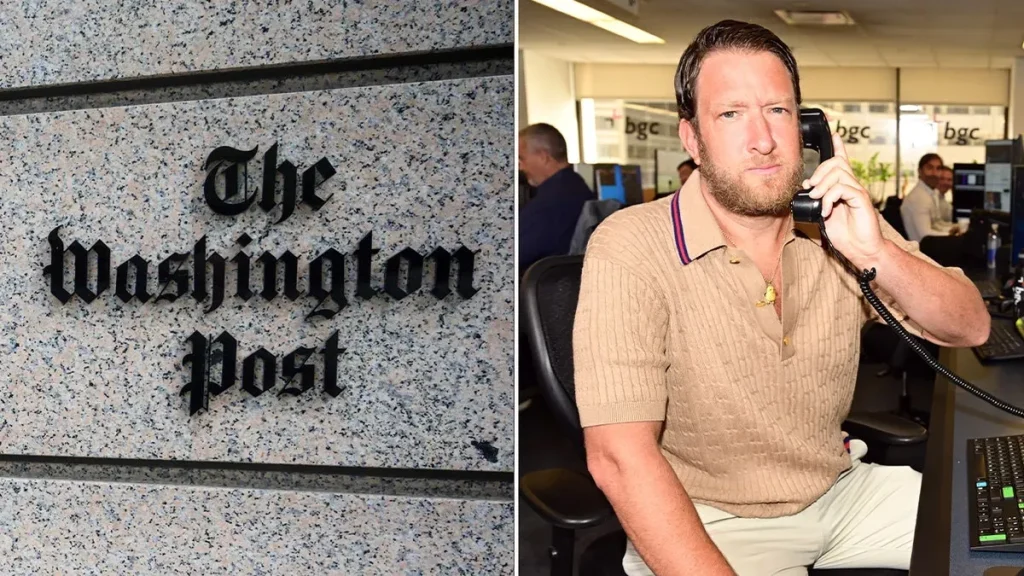The recent Dave Portnoy antisemitism incident has ignited a wave of controversy surrounding Barstool Sports and its founder. Over the weekend, a disturbing video surfaced, showcasing an antisemitic sign that read “f— the Jews,” which led to Portnoy’s controversial response. Initially, he proposed a so-called “teachable moment” for the individuals involved, suggesting they visit Auschwitz to learn about the Holocaust. However, this offer quickly unraveled when one of the parties, Mo Kahn, posted an Instagram statement that denied his involvement in the display of the sign. The fallout from this incident has prompted discussions not only about accountability but also about the broader implications of antisemitic sentiments and the responsibility of public figures like Portnoy in addressing such serious issues.
This controversy surrounding Dave Portnoy has raised crucial questions about accountability in the face of hate speech. The antisemitic sign incident and the ensuing Barstool Sports fallout have highlighted how quickly misinformation can spread on social media platforms. As public figures engage in discussions about sensitive topics, such as antisemitism, the need for thoughtful dialogue becomes ever more apparent. Mo Kahn’s Instagram response only adds layers to this ongoing narrative, illustrating how individuals navigate public scrutiny and the repercussions of their past actions. Ultimately, this situation serves as a stark reminder of the importance of creating a safe and respectful environment for all, encouraging discourse that contributes positively to society.
The Dave Portnoy Antisemitism Incident Explained
The recent incident involving Dave Portnoy has sparked significant controversy and discussion surrounding antisemitism in the media space. Portnoy, the founder of Barstool Sports, found himself at the center of a storm after acknowledging a ‘teachable moment’ related to a group of individuals who displayed an antisemitic sign at one of his company’s venues. The sign, which openly declared hatred with the phrase ‘f— the Jews,’ has raised eyebrows and prompted serious questions about the responsibilities of public figures in addressing such events.
In a video statement, Portnoy expressed his initial proposal to send the individuals responsible for the sign to Auschwitz, aiming to educate them on the ramifications of their actions. However, the situation escalated when one of the individuals, identified as Mo Kahn, attempted to distance himself from the incident through an Instagram statement claiming to be an innocent bystander. This contradictory behavior has led to criticisms of both Kahn’s and Portnoy’s responses, highlighting the urgent need for authentic accountability when addressing antisemitism.
Understanding the Barstool Sports Controversy
The Barstool Sports controversy surrounding the antisemitic sign has drawn considerable attention, reflecting broader societal issues regarding hate speech and its normalization. As public discourse becomes increasingly polarized, incidents like this emphasize the urgency of dialogue surrounding hate and its implications in popular culture. Portnoy’s handling of the situation, initially appearing to take a stance against hate, quickly morphed into a PR challenge, as he later retreated from his offer to Kahn, claiming insincerity on the part of those involved.
This controversy exemplifies how social media can amplify messages, whether it be for good or harm. Videos of the antisemitic sign circulated rapidly, illustrating the potential for immediate backlash against perceived hate speech within various communities. As Barstool Sports continues to grow, the event serves as a reminder of the power and responsibility that public figures have in shaping societal narratives, especially in environments that promote camaraderie among sports enthusiasts.
Mo Kahn’s Instagram Statement and Its Implications
In the aftermath of the antisemitism incident, Mo Kahn’s Instagram statement became a focal point for discussion. In his post, Kahn described himself as a ‘citizen journalist,’ attempting to present himself as an unbiased observer who was not directly involved in the incident. This portrayal sparked criticism as many questioned the authenticity of his claims, especially given the nature of the content that was shared on social media.
Kahn’s statement indicated his discomfort with the backlash and threats he faced following the video’s viral nature. This response opened the floor to an important conversation about accountability in the digital age. When individuals participate in online spaces, they inherently carry the risks of their actions being scrutinized. The situation raises the question: What role should social media play in ensuring that users understand the impacts of their shared content?
Turning Controversy into a Teachable Moment
Dave Portnoy’s idea of transforming the antisemitism incident into a ‘teachable moment’ resonates deeply within discussions about hate and accountability. He initially sought to provide education through exposure to historical realities, suggesting a visit to Auschwitz. However, the complexities of Mo Kahn’s repudiation of his involvement complicated this objective, making observers question whether a genuine desire for growth was present.
While Portnoy’s intentions might have been pure at the start, the subsequent developments showed that the concept of a teachable moment can only succeed when all parties acknowledge their roles in the event. Kahn’s actions and statements indicated a reluctance to fully engage with the destructive implications of antisemitism, reducing the potential for this incident to evolve into a constructive learning opportunity. Therefore, it reiterates the importance of honesty and accountability in learning environments.
The Role of Social Media in Amplifying Hate Speech
In this digital age, social media plays a crucial role in how messages are disseminated and perceived. The rapid circulation of the footage featuring the antisemitic sign not only amplified the incident but also raised ethical questions about freedom of speech and the boundaries of hate speech. As public figures like Portnoy engage with these platforms, the challenge lies in navigating the fine line between expression and incitement.
Moreover, Kahn’s status as an influencer and the decisions he makes to share content highlight the potential consequences of online behavior. When harmful rhetoric makes its way into mainstream discussion, it not only invites backlash but also shines a light on the systemic issues surrounding hatred and prejudice. The incident involving Kahn and Portnoy thus serves as a reminder of the responsibility individuals hold in managing the narratives shared on social media.
Accountability in the Face of Antisemitism
As the Barstool Sports incident unfolded, the question of accountability became a major theme. Both Portnoy and Kahn found themselves navigating the heavy implications of their decisions and how these would reflect on their public personas. For Portnoy, attempting to maintain a ‘lifeline’ for Kahn revealed the complexities inherent in addressing antisemitism: it demands not only acknowledgment but genuine reflection and action from those involved.
Kahn’s later attempts to shift responsibility showcased a common issue among individuals who are confronted with the consequences of their actions. The community’s response to these events can set a precedent for future accountability—an encouraging step towards fostering an environment where antisemitic actions are unequivocally condemned. The need for transparent discourse is emphasized, as it allows for healing and growth rather than dismissal and division.
The Future of Discussion Around Antisemitism
The fallout from the incident has broad implications for future discussions surrounding antisemitism and hate speech. As public incidents like this continue to emerge, it underscores the necessity of an open dialogue that addresses both the larger societal issues at play and the responsibilities of individuals within the media. Lessons learned from Portnoy’s handling of the situation could inform how others approach similar matters, recognizing the pivotal role communication plays in shaping public attitudes.
Going forward, it is essential to cultivate spaces where individuals can discuss sensitive topics, such as antisemitism, without the fear of backlash. Encouraging candid conversations may pave the way for understanding and acceptance, which are vital for fostering unity in a divided world. As social media platforms evolve, equipping users with better tools for constructive engagement and accountability will be crucial in mitigating incidents of hate.
Impacts of the Incident on Barstool Sports
The antisemitism incident has thrust Barstool Sports into the spotlight, raising questions about its values and the impact of its leadership. As a major player in the sports media industry, the responses from Portnoy and the brand itself will likely influence public perception and trust. How Barstool navigates this controversy can define its reputation moving forward; transparency and a commitment to addressing hate will be critical for restoring confidence among its audience.
Furthermore, the incident may serve as a wake-up call for organizations operating in high-energy environments like that of sports media—is it enough to merely denounce hate without taking active steps to educate and create a better atmosphere? The episode highlights the necessity for brands to not only confront issues as they arise but also work proactively to dismantle the culture that allows for such incidents to take place.
Lessons for Future Generations Around Hate Speech
The incidents involving Dave Portnoy and Mo Kahn can serve as important case studies for future generations on the importance of understanding and dismantling hate speech. By analyzing the events and responses, young people can learn about accountability and the repercussions of their actions in a connected world. Key conversations surrounding these topics should become integral components of educational curriculums, ensuring that lessons about hate are not only learned but ingrained.
Moreover, it is essential to foster a culture where the denouncement of hate is the norm rather than the exception. As public figures like Portnoy take center stage in these discussions, they hold the power to influence societal attitudes profoundly. By prioritizing education around antisemitism and promoting empathy, future generations will be better equipped to challenge bigotry and create a more inclusive environment for all.
Frequently Asked Questions
What sparked the Dave Portnoy antisemitism incident involving Barstool Sports?
The Dave Portnoy antisemitism incident was sparked by a video that circulated on social media showing a sign that read “f— the Jews” at one of Barstool Sports’ bars. The inappropriate nature of this sign led to significant backlash and highlighted the need for accountability.
What was Dave Portnoy’s initial response to the antisemitic sign incident?
Initially, Dave Portnoy responded to the antisemitic sign incident by offering a ‘teachable moment’ for one of the individuals involved. He suggested sending them to Auschwitz to learn about the Holocaust, highlighting his commitment to addressing antisemitism.
How did Mo Kahn respond to the controversy surrounding the antisemitic video?
Mo Kahn, one of the individuals involved, posted a statement on Instagram claiming he had no involvement with the antisemitic sign. He described facing threats and emphasized his abhorrence of hate, suggesting that he was a ‘citizen journalist’ documenting the incident.
What did Dave Portnoy say about Mo Kahn’s involvement in the antisemitism incident?
Dave Portnoy confronted Mo Kahn about the antisemitic incident and expressed confusion over Kahn’s denial, especially since Kahn had previously posted about the event on Instagram. Portnoy noted Ken’s history of making antisemitic jokes, questioning his claims of innocence.
Did Dave Portnoy go through with the ‘teachable moment’ offer after speaking with Kahn?
No, after speaking with Mo Kahn and hearing his denial of involvement, Dave Portnoy decided to withdraw the ‘teachable moment’ offer. He expressed frustration over Kahn’s demeanor and refusal to take accountability for the sign.
What were the implications of the barstool sports controversy related to the antisemitic sign?
The Barstool Sports controversy surrounding the antisemitic sign has led to discussions about accountability, the impact of social media on public perceptions, and the importance of addressing hate in all forms in today’s society.
How has the public reacted to the Dave Portnoy antisemitism incident?
Public reaction to the Dave Portnoy antisemitism incident has been mixed, with many condemning the display of hate while also discussing the implications of a public figure attempting to turn a serious situation into a ‘teachable moment’.
Is there an ongoing investigation related to the Dave Portnoy antisemitism incident?
Yes, Philadelphia police are reportedly gathering information regarding the incident involving the antisemitic sign displayed at a Barstool Sports venue, as part of their standard procedure in response to hate-related incidents.
| Key Point | Details |
|---|---|
| Incident Background | Dave Portnoy withdrew a ‘teachable moment’ offer after antisemitic sign incident at a Barstool Sports bar. |
| Antisemitic Sign | A sign displayed at a bar said ‘f— the Jews,’ which caused outrage on social media. |
| Response from Portnoy | Initially offered to send culprits to Auschwitz to learn about the Holocaust. |
| Accountability | Two men involved took accountability, but Mo Kahn denied involvement, claiming he was a ‘citizen journalist.’ |
| Public Reaction | Portnoy was confused by Kahn’s denial and pointed out the inconsistency in his claims. |
| Further Action | Philadelphia police are gathering information about the incident. |
Summary
The Dave Portnoy antisemitism incident highlights the significant implications of displaying hateful messages, particularly in public spaces associated with well-known figures. Following the display of an antisemitic sign at one of Barstool Sports’ venues, Portnoy attempted to turn the situation into a learning opportunity but faced challenges when one of the involved individuals denied accountability. This incident not only reveals the ongoing struggle against antisemitism but also raises important questions about accountability and the influence of social media on public perception.



